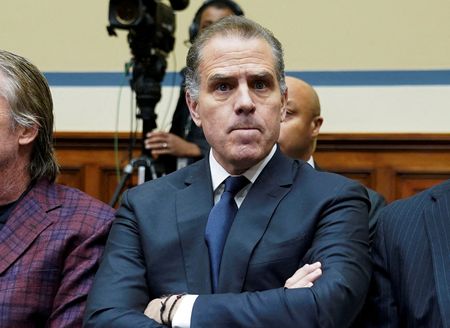WASHINGTON, D.C. — President Donald Trump signed an executive order Monday revoking the security clearances of 50 former intelligence officials who signed an October 2020 letter suggesting that reporting about Hunter Biden’s laptop was likely part of a Russian disinformation campaign. The move, unprecedented in scale, marks a stark rebuke of the officials’ actions during the final weeks of the 2020 presidential election.
The executive order cites “an egregious breach of trust” by the intelligence officials, who used their credentials and reputations to discredit reports about the abandoned laptop, which contained emails and other materials linked to Hunter Biden. The letter, which the officials claimed was rooted in their collective experience, was later widely criticized for lacking evidence and was perceived by some as an effort to influence public opinion before Election Day.
“This fabrication of the imprimatur of the Intelligence Community to suppress information essential to the American people during a presidential election is an egregious breach of trust reminiscent of a third-world country,” the order states.
The officials whose security clearances were revoked include several high-ranking figures from the intelligence community, such as former CIA Directors John O. Brennan, Michael V. Hayden, and Leon E. Panetta; former Director of National Intelligence James R. Clapper Jr.; and numerous former senior intelligence officials, analysts, and operatives. The list also includes John R. Bolton, the former National Security Advisor, whose clearance was revoked in part due to the publication of a 2020 memoir that the administration claims contained classified information.
Backdrop to the controversy
The letter at the center of the controversy was signed by 51 former intelligence officials and issued just weeks before the 2020 presidential election. It suggested that the Hunter Biden laptop story, first reported by the New York Post, bore “all the classic earmarks of a Russian disinformation operation.” Although the letter did not definitively state that the laptop was part of such an operation, it implied that the reporting was suspect and urged caution in accepting its authenticity.
The laptop, which Hunter Biden allegedly abandoned at a computer repair shop in Delaware, contained emails and other materials that raised questions about his business dealings and their potential ties to his father, then-candidate Joe Biden. Subsequent investigations and reporting confirmed the authenticity of the laptop, contradicting the claims made in the letter.
The executive order notes that some signatories held active security clearances at the time the letter was published and maintained contractual relationships with the CIA. The letter had reportedly been reviewed by the CIA Prepublication Classification Review Board, a body tasked with evaluating sensitive documents before publication.
“The faith of Americans in all other patriotic intelligence professionals who are sworn to protect the Nation has been imperiled,” the order states.
Key figures targeted by the order
Among the 50 individuals whose security clearances were revoked are several prominent former officials who held significant positions in the intelligence community:
- James R. Clapper Jr., former Director of National Intelligence
- Michael V. Hayden, former Director of the CIA and NSA
- Leon E. Panetta, former CIA Director and Secretary of Defense
- John O. Brennan, former CIA Director
- Michael J. Morell, former Acting CIA Director, who played a prominent role in coordinating the letter, according to reports
Others on the list include former senior CIA analysts, operatives, and agency heads, such as Glenn S. Gerstell, Jeremy B. Bash, David Priess, Nada G. Bakos, and Jonna H. Mendez.
John R. Bolton, whose 2020 memoir The Room Where It Happened contained sensitive details from his tenure as National Security Advisor, was also named in the order. The administration criticized Bolton for “reckless treatment of sensitive information” that it said undermined the ability of future presidents to seek candid advice on national security matters.
Administration’s justification
The Trump administration framed the decision as a necessary step to protect the integrity of the intelligence community and its role in national security. “Federal policymakers must be able to rely on analysis conducted by the Intelligence Community and be confident that it is accurate, crafted with professionalism, and free from politically motivated engineering to affect political outcomes in the United States,” the order reads.
The order specifically targets individuals who, according to the administration, “weaponized the gravitas of the Intelligence Community” to influence a presidential election. The letter, it argues, undermined the democratic process and eroded public trust in intelligence agencies.
Additionally, the order addresses concerns about the publication of classified information. It calls for a review of intelligence community policies to prevent the misuse of security clearances for political purposes and to deter unauthorized disclosures in the future.

